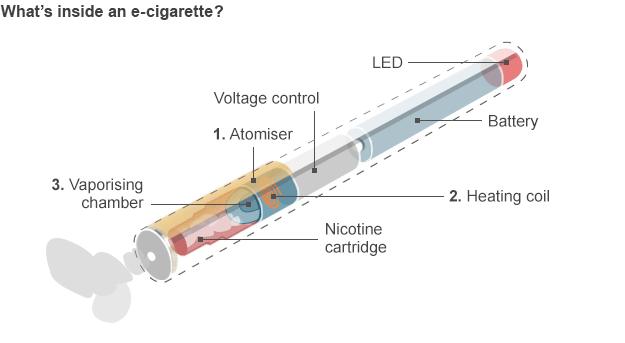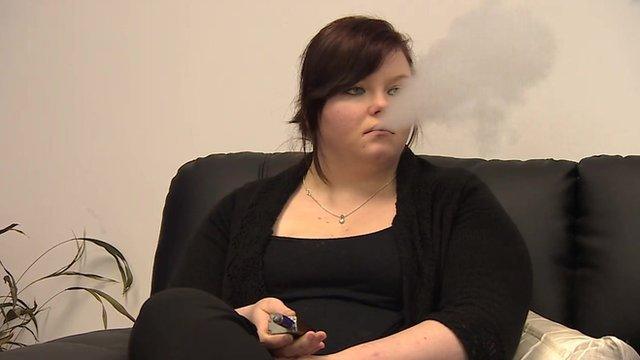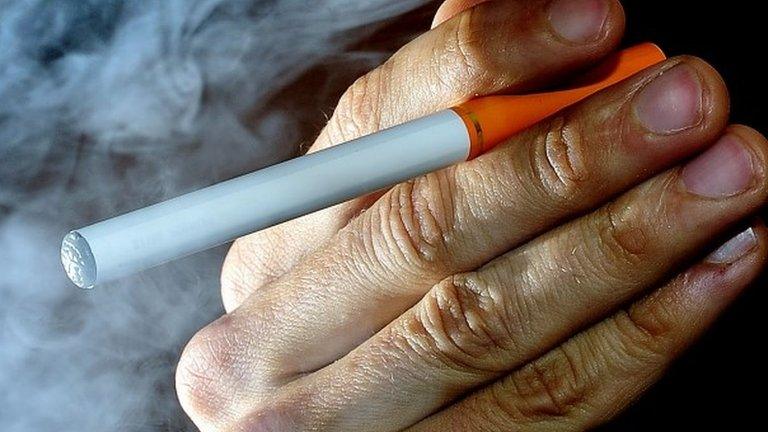First e-cigarette 'vaping' appear on TV
- Published
- comments
The first UK advert showing people using e-cigarettes is due to be shown on TV
The first UK TV adverts featuring the use of an electronic cigarette - vaping - are being shown.
While e-cigarette adverts have been on television for some time, showing the device itself was banned until a change in advertising rules which came into force on Monday.
The Committee of Advertising Practice has ruled that adverts must not show tobacco "in a positive light".
Critics warn showing e-cigarette use could normalise the imagery of smoking.
The British government banned cigarette advertising on television in 1965.

1. On some e-cigarettes, inhalation activates the battery-powered atomiser. Other types are manually switched on.
2. A heating coil inside the atomiser heats liquid nicotine contained in a cartridge.
3. Liquid nicotine becomes vapour and is inhaled. The "smoke" produced is largely water vapour. Many e-cigarettes have an LED light as a cosmetic feature to simulate traditional cigarette glow.

Post-watershed
The new rules, put in place by the Committee of Advertising Practice (CAP) state that adverts must not:
be "likely to appeal particularly to people under 18, especially by reflecting or being associated with youth culture"
encourage non-smokers to use e-cigarettes
claim e-cigarettes are "safer" or "healthier" than smoking tobacco
make any health claims without approval from the Medicines and Healthcare Products Regulatory Agency
One advert, featuring a group "vaping" while having a meal, was shown in the morning on Channel 5.
Sandy Chadha, the chief executive of e-cigarette producers KiK, said: "The new advertising rules are a positive step to show people how vaping can help them move away from tobacco products and we are delighted to make history.
"Vaping is a new way of life for past smokers and the advert highlights friends talking about the impact making the change has had for them. We hope it is well received and gives smokers some food for thought."
Another advert, showing a woman exhaling vapour from an e-cigarette, will be shown in the evening.
Dave Levin of VIP, the Bury-based company behind the advert, says: "E-cigarettes have attracted a lot of controversy recently, which has largely been due to concerns over safety, so it will be interesting to see how people respond to our advert's debut."
Prof Martin McKee, of the London School of Hygiene and Tropical Medicine, opposed the change to advertising rules.
He told the BBC: "This is a very daft idea, as many of us said during the consultation.
"A lot of questions need to be answered about e-cigarettes before adverts are even considered.
"First we need to get an agreement on whether they aid people to quit smoking or whether they become a lifestyle choice that people are going to use for 40 years - this hasn't been resolved yet.
"And there are still huge questions about their safety," Prof McKee added.
"Experts are also particularly concerned the adverts may lead to the renormalisation of images of smoking again. A number of e-cigarette companies are owned by the tobacco industry."
Serious concerns
Deborah Arnott, chief executive of health charity Ash, commented: "There is growing evidence that people are using electronic cigarettes as a way of cutting down or quitting smoking and very little evidence of people who have never smoked using them.
"Vaping is safer than smoking, but e-cigarettes should only be promoted to smokers.
"The VIP adverts sexualise e-cigarette use and encourage their use by everyone, not just smokers," she said.
"Ash doesn't see how these adverts conform to the guidelines and if they do then we are seriously concerned that the advertising guidelines are not fit for purpose."
"There is a place for responsible advertising of e-cigarettes but this isn't it."
The BMA said it was encouraged that the decision will be reviewed after 12 months "as advertising regulation must match changes in the market."
- Published28 April 2014

- Published31 July 2014

- Published26 August 2014

- Published9 October 2014
